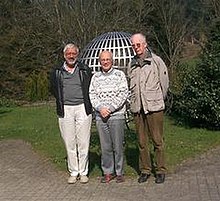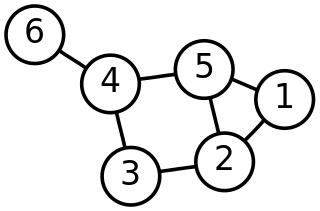
Discrete mathematics is the study of mathematical structures that can be considered "discrete" rather than "continuous". Objects studied in discrete mathematics include integers, graphs, and statements in logic. By contrast, discrete mathematics excludes topics in "continuous mathematics" such as real numbers, calculus or Euclidean geometry. Discrete objects can often be enumerated by integers; more formally, discrete mathematics has been characterized as the branch of mathematics dealing with countable sets. However, there is no exact definition of the term "discrete mathematics".
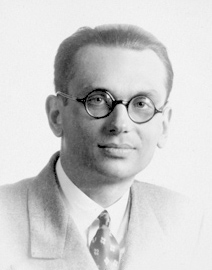
Kurt Friedrich Gödel was a logician, mathematician, and philosopher. Considered along with Aristotle and Gottlob Frege to be one of the most significant logicians in history, Gödel had an immense effect upon scientific and philosophical thinking in the 20th century, a time when others such as Bertrand Russell, Alfred North Whitehead, and David Hilbert were using logic and set theory to investigate the foundations of mathematics, building on earlier work by the likes of Richard Dedekind, Georg Cantor and Gottlob Frege.
Mathematical logic is the study of formal logic within mathematics. Major subareas include model theory, proof theory, set theory, and recursion theory. Research in mathematical logic commonly addresses the mathematical properties of formal systems of logic such as their expressive or deductive power. However, it can also include uses of logic to characterize correct mathematical reasoning or to establish foundations of mathematics.

Gerhard Karl Erich Gentzen was a German mathematician and logician. He made major contributions to the foundations of mathematics, proof theory, especially on natural deduction and sequent calculus. He died of starvation in a Czech prison camp in Prague in 1945, having been interned as a German national after the Second World War.
In logic, a logical framework provides a means to define a logic as a signature in a higher-order type theory in such a way that provability of a formula in the original logic reduces to a type inhabitation problem in the framework type theory. This approach has been used successfully for (interactive) automated theorem proving. The first logical framework was Automath; however, the name of the idea comes from the more widely known Edinburgh Logical Framework, LF. Several more recent proof tools like Isabelle are based on this idea. Unlike a direct embedding, the logical framework approach allows many logics to be embedded in the same type system.

Logic in computer science covers the overlap between the field of logic and that of computer science. The topic can essentially be divided into three main areas:

László Kalmár was a Hungarian mathematician and Professor at the University of Szeged. Kalmár is considered the founder of mathematical logic and theoretical computer science in Hungary.

Friedrich Ludwig "Fritz" Bauer was a German pioneer of computer science and professor at the Technical University of Munich.

The Gottfried Wilhelm Leibniz Prize, or Leibniz Prize, is awarded by the German Research Foundation to "exceptional scientists and academics for their outstanding achievements in the field of research". Since 1986, up to ten prizes have been awarded annually to individuals or research groups working at a research institution in Germany or at a German research institution abroad. It is considered the most important research award in Germany.

Anne Sjerp Troelstra was a professor of pure mathematics and foundations of mathematics at the Institute for Logic, Language and Computation (ILLC) of the University of Amsterdam.

Kurt Mehlhorn is a German theoretical computer scientist. He has been a vice president of the Max Planck Society and is director of the Max Planck Institute for Computer Science.

Kurt Schütte was a German mathematician who worked on proof theory and ordinal analysis. The Feferman–Schütte ordinal, which he showed to be the precise ordinal bound for predicativity, is named after him. He was the doctoral advisor of 16 students, including Wolfgang Bibel, Wolfgang Maaß, Wolfram Pohlers, and Martin Wirsing.

Wilfried Brauer was a German computer scientist and professor emeritus at Technical University of Munich.

Ruy J. Guerra B. de Queiroz is an associate professor at Universidade Federal de Pernambuco and holds significant works in the research fields of Mathematical logic, proof theory, foundations of mathematics and philosophy of mathematics. He is the founder of the Workshop on Logic, Language, Information and Computation (WoLLIC), which has been organised annually since 1994, typically in June or July.
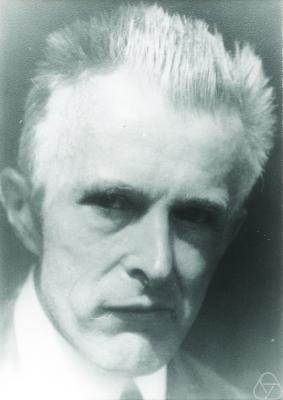
Heinrich Scholz was a German logician, philosopher, and Protestant theologian. He was a peer of Alan Turing who mentioned Scholz when writing with regard to the reception of "On Computable Numbers, with an Application to the Entscheidungsproblem": "I have had two letters asking for reprints, one from Braithwaite at King's and one from a professor [sic] in Germany... They seemed very much interested in the paper. [...] I was disappointed by its reception here."

Gisbert F. R. Hasenjaeger was a German mathematical logician. Independently and simultaneously with Leon Henkin in 1949, he developed a new proof of the completeness theorem of Kurt Gödel for predicate logic. He worked as an assistant to Heinrich Scholz at Section IVa of Oberkommando der Wehrmacht Chiffrierabteilung, and was responsible for the security of the Enigma machine.
Gunther Schmidt is a German mathematician who works also in informatics.
Martin Wirsing is a German computer scientist, and Professor at the Ludwig-Maximilians-Universität München, Germany.
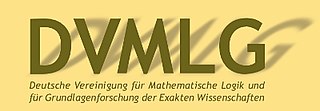
The German Association for Mathematical Logic and for Basic Research in the Exact Sciences is the learned society representing the interdisciplinary research area of Logic (within the disciplines of Mathematics, Philosophy, Computer Science, and Linguistics) in German-speaking countries. It was founded in 1962 by Wilhelm Ackermann, Gisbert Hasenjaeger, Hans Hermes, Jürgen von Kempski, Paul Lorenzen, Arnold Schmidt, and Kurt Schütte. Its members are researchers in Mathematical Logic, Philosophical Logic, and Theoretical Computer Science. Biannually, the DVMLG organises the Colloquium Logicum, an international research conference in logic. The DVMLG forms the National Committee for Logic, Methodology and Philosophy of Science representing the Ordinary Member Germany within the Division of Logic, Methodology and Philosophy of Science and Technology (DLMPST).

Otto Forster is a German mathematician.

